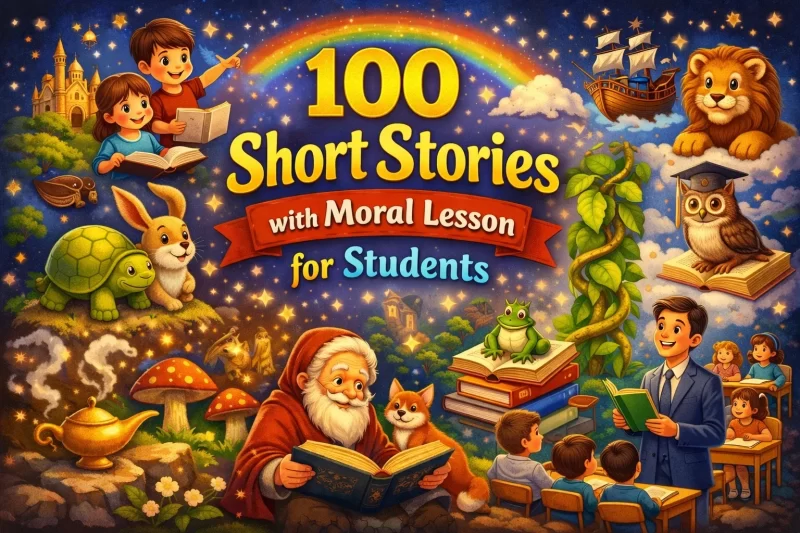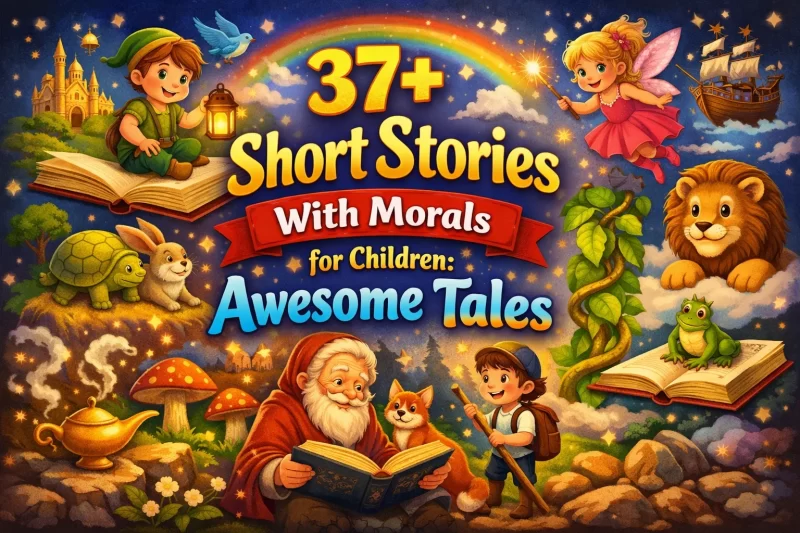These Top 13 Very Short Stories with morals in English not only inspire your kid but also improve English for your kids, As well as Kindness, Respect, and Responsibility. Short moral stories for kids teach the kids life lessons in the easiest and most unique way.
The Proud Peacock: Humility and Modesty
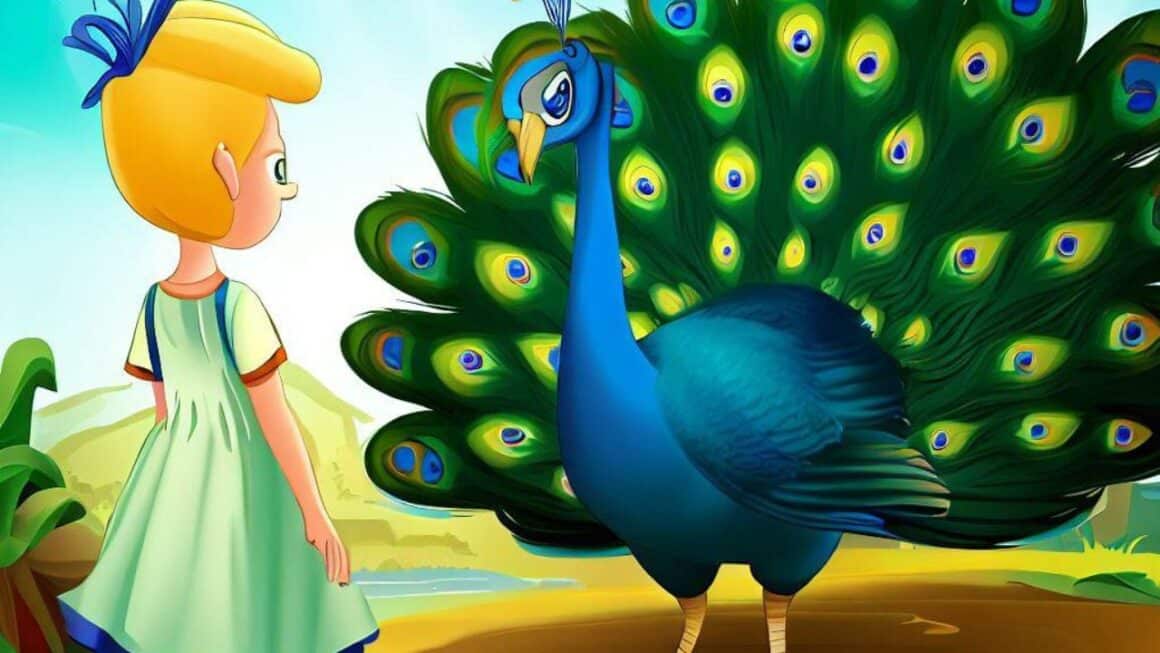
Once upon a time, there was a proud peacock who boasted about his magnificent and colorful feathers. He would flaunt his beauty and attract the attention of everyone in the forest. The other animals admired him, but they also felt a tinge of envy.
One day, a wise old owl approached the peacock and said, “Dear peacock, your feathers are indeed splendid, but remember that true beauty lies within. Humility and modesty are virtues that make one truly admirable.”
The peacock dismissed the owl’s words, believing that his outer beauty was enough. But as time went by, the peacock’s behavior began to alienate the other animals. They grew tired of his arrogance and started to ignore him.
Feeling lonely and rejected, the peacock approached the wise old owl once again. This time, he humbly asked for advice on how to win back the respect and friendship of the forest animals.
The owl smiled and said, “My dear peacock, it is never too late to change. Embrace humility and modesty, and let your actions speak louder than your feathers. Treat others with kindness and respect, and you will find true happiness and acceptance.”
From that day forward, the peacock transformed his ways. He learned to value inner beauty and displayed kindness towards others. Gradually, the forest animals began to see the change in him and welcomed him back into their midst.
The moral of the story is that true beauty lies in humility and modesty. Outer appearances may attract attention, but it is one’s character and actions that win respect and genuine friendships.
The Magic Pot: Greed Leads to Unintended Consequences

In a small village, there lived a poor but honest farmer named Anand. One day, while plowing his field, he stumbled upon a magical pot buried in the soil. The pot had the power to grant wishes. Overjoyed, Anand thought about all the riches he could acquire and the luxuries he could enjoy.
Anand took the pot home and eagerly made his first wish for a large bag of gold. Immediately, the pot produced a bag filled with shiny gold coins. Delighted, Anand became consumed by greed and started making more and more wishes for wealth and possessions.
However, Anand soon realized that his greed had unintended consequences. The more wishes he made, the more the pot produced, filling his house with an abundance of material possessions. The once humble farmer became lost in his newfound wealth and became isolated from his friends and family.
One day, Anand made a wish to stop the never-ending flow of riches. But to his horror, the pot refused to grant his wish. The pot’s magic had a price, and Anand had to learn it the hard way.
Realizing the error of his ways, Anand sought the advice of a wise sage. The sage explained, “Greed blinds us to the true value of things. It is better to appreciate what we have and be content rather than constantly seeking more.”
Anand understood the sage’s wisdom and decided to use the pot’s power for the benefit of others. He started making wishes to help his village, providing food, shelter, and education to those in need. In doing so, Anand found true happiness and fulfillment.
The moral of the story is that greed leads to unintended consequences. It is important to be content with what we have and use our blessings to help others rather than being consumed by material desires.
The Three Little Pigs: The Importance of Diligence and Preparedness
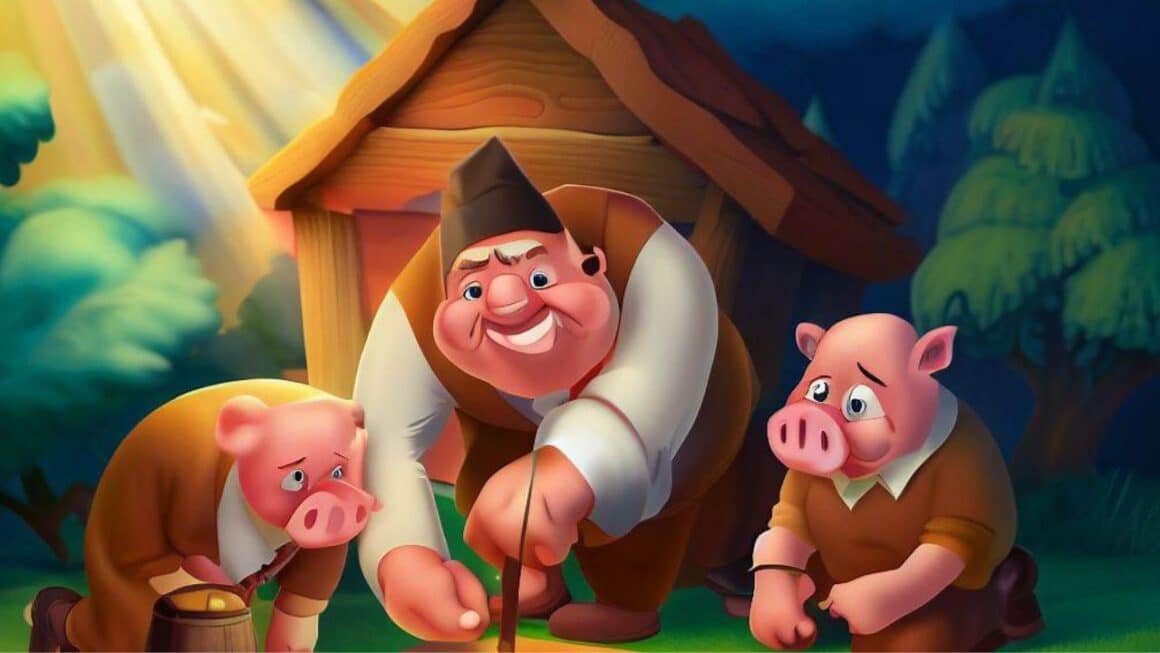
Once upon a time, there were three little pigs who lived with their mother. As they grew older, their mother knew it was time for them to leave the comfort of their home and build their own houses.
The first little pig was lazy and built his house with straw. He believed that it would be quick and easy, allowing him more time to play. The second little pig was slightly more diligent and built his house with sticks. He thought it would provide better protection than straw but required less effort than building with bricks.
The third little pig, however, was wise and hardworking. He knew the importance of diligence and preparedness. He spent days constructing a sturdy house made of bricks. It required more time and effort, but he understood that it would provide the best protection against any danger.
One day, a big bad wolf came to the village. He huffed and puffed, blowing down the houses of the lazy first pig and the slightly diligent second pig with ease. Both pigs had to seek refuge in the third pig’s strong brick house.
The wolf, unable to destroy the brick house, tried to trick the little pigs into opening the door. But the wise pig was prepared and refused to let the wolf inside. Frustrated, the wolf eventually gave up and went away.
The three little pigs learned an important lesson. The first pig realized the consequences of laziness and taking shortcuts. The second pig understood the value of putting in more effort and making better choices. And the third pig saw the rewards of diligence and preparedness.
The moral of the story is that diligence and preparedness lead to success and protection. Taking shortcuts and being lazy can have dire consequences, while hard work and careful planning pay off in the long run.
The Selfless Mouse: The Value of Sacrifice
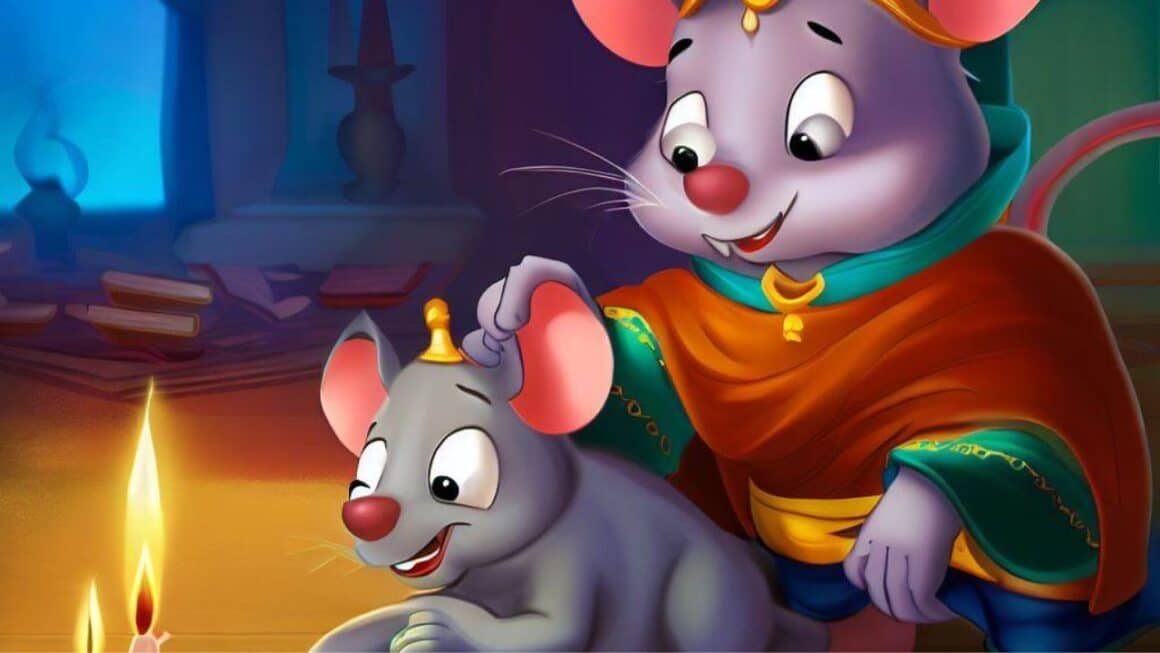
In a dense forest, a little mouse named Maya lived with her family. Maya was known for her kind and selfless nature. One day, as she was scurrying about, she overheard a conversation among the forest animals about a hunter who was setting traps in the area.
Worried about the safety of her fellow creatures, Maya decided to warn them about the impending danger. She went from animal to animal, spreading the news and advising them to be cautious. The animals were grateful for Maya’s concern and took necessary precautions.
However, when Maya reached the river, she noticed a large group of mice huddled together on a tiny island. They were too scared to swim across to safety. Maya knew that if she didn’t act quickly, they would fall victim to the hunter’s traps.
Without hesitation, Maya jumped into the river and swam towards the island. She guided each mouse, one by one, back to the shore, saving them from imminent danger. Exhausted but satisfied, Maya returned to her family, knowing she had made a difference.
The news of Maya’s bravery and selflessness spread throughout the forest, and the animals praised her for her courage. From that day forward, Maya became a symbol of sacrifice and compassion.
The moral of the story is that selflessness and sacrifice bring joy and make the world a better place. Small acts of kindness can have a big impact and inspire others to follow suit.
The Ugly Duckling: Embracing Differences and Self-Acceptance
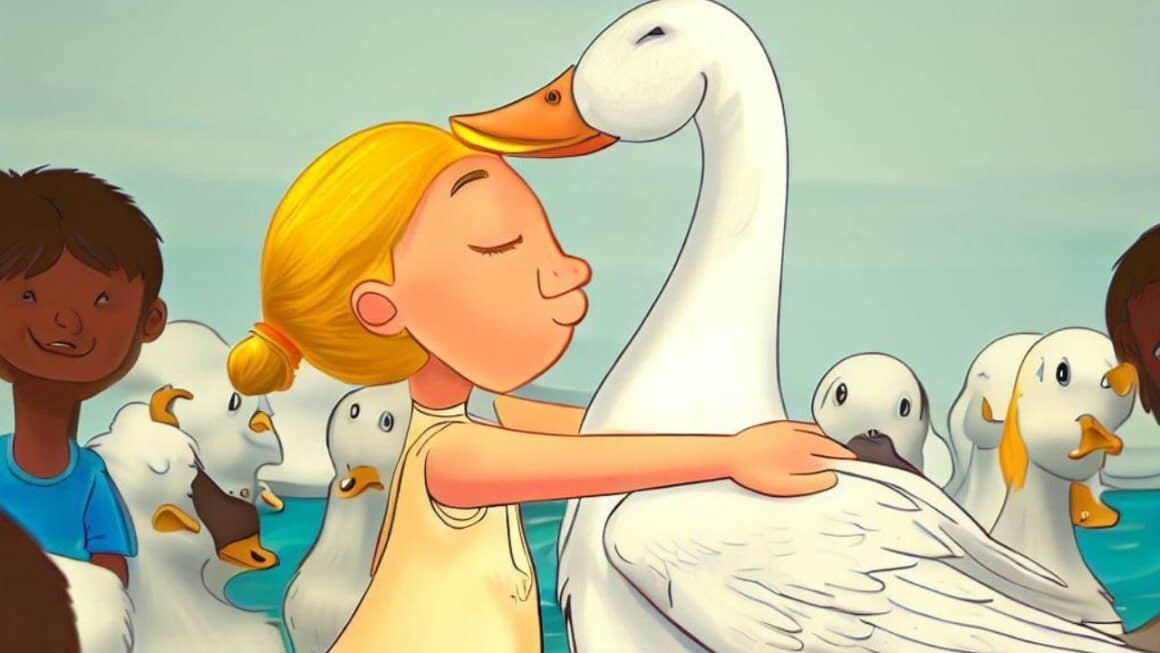
Once upon a time, on a peaceful farm, a mother duck was patiently waiting for her eggs to hatch. After a few weeks, the eggs cracked open one by one, and adorable little ducklings emerged, chirping and waddling around. However, one of the ducklings looked different from the rest. He was larger, had a clumsy walk, and his feathers were an awkward gray color.
The other ducklings teased and laughed at him, calling him the “Ugly Duckling.” Feeling sad and rejected, the Ugly Duckling started to believe that he was indeed ugly and didn’t belong with the other ducks. He decided to run away from the farm and find a place where he could be accepted.
As he journeyed through forests, ponds, and meadows, the Ugly Duckling encountered different animals. Each time, he hoped to find a group where he would finally fit in, but he faced rejection everywhere he went. The Ugly Duckling’s self-esteem plummeted, and he began to lose hope.
One day, as winter approached, the Ugly Duckling stumbled upon a flock of beautiful white swans swimming gracefully on a sparkling lake. He was captivated by their elegance and wished to be like them. Trembling with fear, he approached the swans, expecting them to reject him like everyone else.
To his amazement, the swans welcomed him with open wings. As he looked into the water, he saw his reflection – he had transformed into a magnificent swan himself! The Ugly Duckling realized that he was never an ugly duckling but a swan all along. He embraced his true self and found a place where he belonged.
The moral of the story is that we should embrace our differences and accept ourselves for who we are. Just like the Ugly Duckling, we may feel out of place at times, but it’s important to remember that our uniqueness is what makes us special. True beauty comes from self-acceptance and embracing our true selves.
The Wise King: Just and Fair Leadership
In a kingdom far away, there once lived a wise and just king. He was loved and respected by his subjects for his fairness and impartiality. The king believed in treating everyone with kindness and providing equal opportunities to all.
One day, two men approached the king, each claiming to be the rightful owner of a beautiful piece of land. The king listened attentively to both sides of the story, carefully considering the evidence presented. After a thorough investigation, he realized that both men had valid claims, and it was a challenging decision to make.
Instead of making a hasty judgment, the king decided to split the land in half, giving each man an equal share. Although it wasn’t the ideal solution for either party, the king believed it was the fairest outcome, as both men had genuine rights to the land.
The news of the king’s decision spread throughout the kingdom, and people marveled at his wisdom and fairness. They respected him even more because he prioritized justice over personal biases or favoritism.
The wise king’s reputation reached neighboring kingdoms, and he was known as a symbol of just leadership. Other rulers sought his advice on important matters, and he became a peacemaker in times of conflict. The kingdom thrived under his reign, and the people lived in harmony and prosperity.
The moral of the story is that just and fair leadership can inspire trust and loyalty among the people. A wise leader understands the importance of impartiality and strives to make decisions that uphold justice and benefit society as a whole.
The Golden Touch: The Danger of Materialism
Once upon a time, there was a king named Midas who ruled a prosperous kingdom. Despite his wealth and power, he was never satisfied. He was obsessed with acquiring more riches and believed that material possessions would bring him eternal happiness.
One day, a mysterious stranger appeared before King Midas and offered him a gift. The stranger said, “I will grant you the power to turn anything you touch into gold. However, remember that true happiness cannot be found in wealth alone.”
Overjoyed by the prospect of unlimited riches, King Midas eagerly accepted the gift. He touched a nearby tree, and it instantly turned into solid gold. Ecstatic with his newfound power, he turned everything he touched into gold – flowers, animals, and even his own food.
Initially, King Midas reveled in his golden kingdom. But soon, he realized the devastating consequences of his greed. His beloved daughter, whom he loved more than anything in the world, ran to embrace him. To his horror, she turned into a lifeless golden statue.
King Midas was devastated. He realized that his insatiable desire for wealth had cost him the most precious thing in his life – his daughter’s love. He begged the stranger to take back his golden touch and restore his daughter’s life.
The stranger appeared once again and granted King Midas’s wish. The king learned a valuable lesson – that material possessions are meaningless compared to the love and relationships that bring true happiness.
From that day forward, King Midas became a changed man. He renounced his obsession with wealth and focused on nurturing his relationships with his subjects and his daughter. He became known as a wise and compassionate ruler, valuing the true treasures of life.
The moral of the story is that the pursuit of material possessions can blind us to the genuine joys in life. True happiness is not found in accumulating wealth but in cherishing the relationships and experiences that enrich our lives.
The Boy with the Golden Heart: Kindness Can Change Lives
In a small village, there lived a young boy named Alex. He was known for his gentle nature and kind heart. Even though he came from a humble background, he always went out of his way to help others in need.
One day, a poor old man wandered into the village. He was hungry, cold, and in desperate need of assistance. Most people ignored him or looked away, but Alex approached the man with compassion. He shared his own meal, offered him warm clothing, and listened to his story.
The old man was deeply touched by Alex’s kindness. He revealed himself to be a magical being, blessed with the power to grant one wish to anyone who showed genuine compassion. He said, “Alex, your kindness has moved me. I would like to reward you with a wish. What is it that you desire?”
Without hesitation, Alex replied, “I wish for the well-being and happiness of everyone in my village.” The old man smiled and granted his wish.
From that day forward, the village experienced an incredible transformation. People began to treat each other with kindness and empathy. They helped one another, shared resources, and created a strong sense of community. The village flourished, and happiness filled every corner.
Alex’s act of kindness had a ripple effect that changed the lives of everyone around him. The villagers realized the power of compassion and started spreading it to neighboring communities. In time, the entire region became known for its warmth and kindness.
The boy with the golden heart, Alex, grew up to be a respected leader, guiding his village with wisdom and compassion. He showed others that a single act of kindness can have a profound impact on individuals and society as a whole.
The moral of the story is that kindness has the power to change lives. Even the smallest act of compassion can create a positive ripple effect that spreads far beyond our immediate surroundings. By embracing empathy and showing kindness, we can make a significant difference in the world around us.
The Honest Woodcutter: Honesty Rewarded
Once upon a time, in a small village, lived a poor woodcutter. He worked hard every day, cutting down trees in the forest. One day, while he was cutting a tree near a river, his axe slipped from his hand and fell into the water.
The woodcutter was distraught. He couldn’t afford to buy a new axe, and without it, he wouldn’t be able to work and earn a living. He sat by the riverbank, feeling hopeless.
Just then, a magical fairy appeared before him. She asked the woodcutter what was wrong, and he explained his situation. The fairy felt sorry for him and decided to help.
She dived into the river and brought back a golden axe. The woodcutter was overjoyed and thanked the fairy profusely. But the fairy shook her head and said, “This is not your axe. I will get your axe back.”
Again, the fairy disappeared into the river. This time, she came back with a silver axe. The woodcutter was amazed but insisted that it wasn’t his axe.
Finally, the fairy dived into the river for the third time and brought back the woodcutter’s plain iron axe. The woodcutter’s face lit up with happiness, and he gratefully thanked the fairy.
Impressed by the woodcutter’s honesty, the fairy rewarded him by giving him all three axes — the golden one, the silver one, and his own iron axe. The woodcutter learned that honesty is always rewarded in the end.
The Sneaky Fox and the Grateful Crow: Gratitude for Acts of Kindness
In a lush green forest, there lived a clever and sneaky fox. One day, while strolling through the woods, the fox spotted a crow perched on a tree branch. The crow held a piece of delicious cheese in its beak.
The fox, tempted by the sight of the cheese, had an idea to trick the crow. He approached the crow and said, “Oh, what a beautiful bird you are! Your voice must be as enchanting as your appearance. Could you please sing for me?”
The crow, flattered by the fox’s words, opened its beak to sing. As the crow sang, the cheese fell from its beak, and the fox quickly snatched it up.
The crow realized it had been tricked and felt foolish. But instead of feeling angry, the crow decided to be grateful for the lesson it had learned. The crow understood that it should not be easily deceived by flattery.
A few days later, the sneaky fox found himself trapped in a hunter’s net. He struggled to free himself but couldn’t escape. The crow, passing by, noticed the fox’s predicament.
Remembering the lesson it had learned, the crow decided to help the fox. It flew down and pecked at the net until the fox was finally free. The fox thanked the crow and realized the importance of gratitude for acts of kindness.
The Magic Seeds: The Power of Faith and Patience
In a small village, there lived a poor farmer named Ravi. He worked tirelessly in his fields, but the land was barren, and his crops never grew well. One day, a wise old man visited the village and saw Ravi’s struggles.
The old man approached Ravi and said, “I have something that can change your life. Take these magic seeds and plant them in your field. Have faith, water them, and wait patiently.”
Ravi was skeptical but decided to give it a try. He planted the magic seeds in his field, watered them every day, and waited patiently, as the old man had advised.
Days turned into weeks, and weeks turned into months, but nothing seemed to happen. Ravi started losing hope and thought that the old man had tricked him.
Just when Ravi was about to give up, tiny sprouts began to emerge from the ground. The magic seeds had indeed worked their magic. Ravi couldn’t contain his excitement as the sprouts grew into healthy plants.
Soon, Ravi’s field was filled with an abundance of crops. He had more than enough to feed his family and sell at the market. Ravi realized the power of faith and patience. If he hadn’t waited and nurtured the seeds with belief, he would have missed out on the bountiful harvest.
The Talking Drum: The Importance of Listening and Communication
In a distant village, there lived two neighboring tribes who had been enemies for many years. They never spoke to each other and often engaged in conflicts. One day, a wise old man from another land visited the village. He carried a unique instrument known as the talking drum.
The old man explained that the talking drum had the power to communicate messages over long distances. He demonstrated its ability by playing different rhythms on the drum, each representing a specific message.
Curious about the drum’s power, the leaders of both tribes gathered to witness its magic. The old man played a rhythm on the drum, and the message was heard by everyone present. They were amazed by the drum’s ability to convey words without speaking.
Realizing the importance of communication, the leaders decided to use the talking drum to bridge the gap between their tribes. They appointed messengers who would carry the drum and play its rhythms, delivering messages of peace and understanding.
Over time, the tribes started talking and listening to each other. They discovered common ground and resolved their conflicts through peaceful discussions. The talking drum became a symbol of unity and cooperation.
The village prospered as the tribes worked together, sharing resources and knowledge. The people learned the importance of listening and effective communication. The talking drum taught them that words can build bridges and bring harmony where there was once discord.
The Brave Little Rabbit: Courage in the Face of Adversity
Once upon a time, in a lush green meadow, lived a small rabbit named Oliver. He was known as the brave little rabbit because he had a courageous heart that was much larger than his tiny body. Oliver was loved and respected by all the animals in the meadow.
One sunny morning, as Oliver was hopping and playing with his friends, a loud noise startled them. They looked up and saw a group of fierce wolves approaching the meadow. The animals panicked and scattered in all directions, seeking shelter and safety.
Oliver, however, stood his ground. He knew that he had to protect his friends and the meadow they called home. With his heart pounding, he hopped closer to the wolves. They towered over him, their sharp teeth glistening in the sunlight.
“Who do you think you are, little rabbit?” growled the leader of the pack. “This is our territory, and we will not allow any interference.”
But Oliver remained calm and replied, “I may be small, but I have the courage to stand up for what is right. This meadow is our home, and we will not be driven away.”
The wolves laughed mockingly at Oliver’s words. They lunged forward, ready to attack. But just as they were about to reach him, Oliver darted away, leading the wolves on a wild chase through the meadow.
While the wolves pursued him, Oliver cleverly used his small size and agility to outwit them. He zigzagged through bushes, leaped over fallen logs, and squeezed through narrow gaps, always staying one step ahead of the predators.
The chase continued for what seemed like an eternity, but Oliver refused to give up. He knew that if he could lead the wolves away from his friends, they would have a chance to escape to safety.
Finally, as the sun started to set, Oliver led the exhausted wolves far away from the meadow. He stopped, catching his breath, and looked back. The meadow was quiet and peaceful once again. His friends had managed to find shelter during the chaos.
The brave little rabbit had succeeded in protecting his home and his loved ones. Although he was tired and bruised, his heart swelled with a sense of accomplishment and pride.
Word of Oliver’s bravery spread throughout the animal kingdom, and he became a symbol of courage and determination. From that day forward, whenever the animals faced a difficult situation, they would think of the brave little rabbit and find strength within themselves to overcome any adversity.
And so, the legend of Oliver, the brave little rabbit, lived on, teaching generations to come the importance of courage, resilience, and standing up for what is right, no matter how small or insignificant they may seem.
